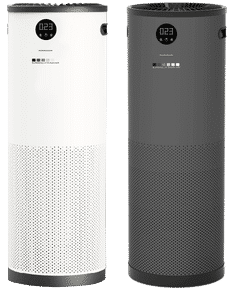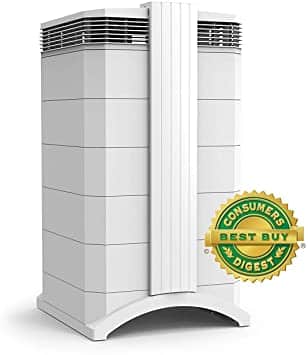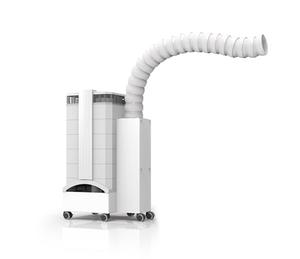There is so much misinformation out there regarding air purification systems for dental offices & I hope this guide provides some relevant information to those that are looking to buy a new filtration device. . .
I am going to review some of the most popular air purification systems available for dentists & explain why I purchased an IQ Air for my office in San Diego, CA.
Lets jump right in . . .

DO I NEED AN AIR PURIFIER IN MY DENTAL PRACTICE?
A lot of my friends have asked me whether it is required to purchase an air purification system for their dental practice post COVID-19. Currently, there are no mandates in place that require offices to purchase air purifiers & the effectivity of these systems against the coronavirus has yet to be scientifically proven.
However, I believe the benefits of owning an air purifier far outweigh the negatives. Let me explain. . .
In dentistry, we confront a variety of bacteria & viruses every single day. Fortunately, most dental offices have rigorous protocols that fight against these infectious diseases.
Disinfecting the office with antibacterial agents & proper disposal of medical waste has been a standard long before "social distancing" & "quarantining" became common language in American culture.
However, it is important we see our shortcomings. . .
Level 1 - 3 masks do not provide enough protection against sub-micron particles. Furthermore, we now know that certain viruses like COVID-19 can remain airborne for long periods of time. Forutnately, we have air filtration systems to reduce the contaminants significantly.
DOWNLOAD OUR FREE SAMPLE OFFICE MANUAL
(LIMITED TIME OFFER)
Enter to Win Free Course Material
HOW TO CHOOSE AIR PURIFIER FOR MY DENTAL PRACTICE?
Choosing the right air purifier can be a daunting task. In our practice, we ultimately decided on purchasing the IQ Air due to a combination of efficacy, reputation & price point. However, it was difficult making this decision since a variety of factors come into play. Here are some things to consider when purchasing a system.
Air Filtration— Some systems utilize HEPA filtration technology while others use UV light technology to aid in filtering the air inside the dental office. Both are effective at improving air quality.
Air-flow capacity—This represents the amount of air that moves through a system. Some systems will “turn over” the indoor air every hour while other may "turn over" the air every ten minutes.
Sound— Air purification systems can be very loud. This may impact the dental operatory as you present treatment plans or communicate with your patients. Look for an air purification unit that generates minimal sound.
Expenses—These systems can break down with time. Consider the costs for replacing a HEPA filter or UV light. Ask each company about the durability of the product & what components require changing.
Currently, there are two big names that keep coming up in dentistry for air filtration systems: Surgically Clean Air & IQ Air
SURGICALLY CLEAN AIR FOR DENTISTS
Surgically clean air is a medical-grade air purification system that can be used in dental offices around the county. The company brochure claims that it uses a variety of technologies to filter air around your operatory:

Below, I have listed the various technology included in the brochure for Surgically Clean Air:
- The pre-filter stage is meant to capture large particulate matter as room air is drawn through the intake chamber. The anti-biotic pre-filter prevents most bacteria and germs from growing.
- The dual-stage electronic precipitator stage captures particulate down to 0.01 microns in size. In the ionizing section of the precipitator, billions of microscopic particles become electronically charged as they pass through the powerful electrical field. The collector plates in the precipitator immediately attract and contain these “charged” particles.
- The activated carbon filter and molecular sieve stage absorbs odours, chemicals and gases.
- The photo-catalytic stage captures residue from destroyed organic VOCs, bacteria and viral organism.
- The dual high intensity, U.V.(ultraviolet) chamber not only disables the DNA of viruses and bacteria, it destroys them.
- Before the pure, clean air is circulated back into the room, the air is revitalized with negative ions. Negative ions increase the flow of oxygen to the brain; resulting in higher alertness, decreased drowsiness and more mental energy.
DOWNLOAD THE FREE PHOTO
QUICK START GUIDE (PDF)
Enter to Win Free Course Material
FREQUENTLY ASKED QUESTIONS
I have attached a series of FAQS relevant to dentistry listed in the company brochure. . .
How much electricity will the SCA unit require?
- The Cascade White air purifier is equivalent to running 2x60W light bulbs
- The Carbon Granite air purifier has an equivalent energy use less than 2x60W light bulbs.
Will the Surgically Clean Air Purifier alter the temperature off my indoor environment?
- Not directly as a Surgically Clean Air Purifier has no heating or cooling components. They do however circulate the air within a room which can have some indirect positive effects on indoor air temperature.
How much noise does the Surgically Clean Air make?
Our unique Sound Dampening Design allows a Surgically Clean Air Purifier to move a large capacity air flow at whisper quiet levels. Approximately, 55dB which is similar to most kitchen dishwashers.
SOUND LEVEL: (Measured at 6ft)
- Low: <45dB (A)
- Medium: <50dB (A)
- High: <55dB (A)
IQ AIR FOR DENTISTS
IQ Air is a Swiss company that uses HyperHEPA filtration technology for airborne particle removal. The company claims that the HyperHEPA filtration has been tested by an independent third-party lab and that it can filter 99.5% of harmful ultrafine pollution particles down to 0.003 microns in size. I purchased two units of IQ air w/ a Flex Vac attachment to aid when performing procedures that generate a high level of aerosols.
The HealthPro Plus is designed with 4 filtration stages. I have included the list of technologies that the company claims to have implement in the IQ Air (Listed on Website)
- Pre Max Micro-Particle Filtration: Eliminates coarse particles like pollen, pet dander, and mold spores.
- V5-Cell Granular Activated Carbon Adsorption & Pelletized Chemisorption: Eliminates volatile organic compounds (the cause of odors) and other harmful chemicals like formaldehyde.
- HyperHEPA Filtration: Eliminates fine and ultrafine particles like bacteria, viruses, and combustion particles
- Option Gas & Odor Filter: It uses a combination of media to help control a wide spectrum of gases and odors: one that adsorbs odors and gases and another that oxidizes the pollutant, resulting in air that is free of odors, gases, and chemicals.
IQAir [HealthPro Plus Air Purifier]

$899.00
How Often Do I Run The System?
This is another popular question I've seen in a variety of the dental forums. IQ Air has a variety of settings which can increase the level of filtration throughout the day. The IQ Air website claims the following: "Generally, when running the system at speed 6 it will take about 15 minutes to clear 50% of the particles in a 900 square-foot room. A smaller room at the same fan speed would achieve results more quickly. Keep in mind that fan speed and room measurements can affect the length of time to achieve results" ( Excerpt from IQ Air Product FAQs)
I plan on running the unit at the highest level until further guidance comes out regarding how filtrations systems should be used in the dental office setting.
What is the FlexVac™on IQ Air?

IQAir also provides a special attachment hose that can be placed near a patient during procedures that generate aerosols. This is an awesome way to minimize the aerosols in front of yourself, your assistants & your patient. The Idea is that this hose can be used to more precisely remove any harmful aerosols directly from the source (aka patient's mouth). Currently IQ Air is charging upwards of $1195 for this attachment.
The company has listed what it can provide for dentists in the IQAir Dental Series. The following information is taken from their webpage.
- Dental Series Pro: Provides exceptional filtration of aerosol particles, bacteria, viruses, mercury vapor, disinfectant smells, and a wide range of VOCs with a HyperHEPA pre-filter and 5 kg of granular impregnated alumina, activated carbon, and impregnated activated carbon.
- Dental Series Hg: Provides maximum protection against aerosol particles and mercury vapor with specialized mercury filtration.
- HealthPro Plus: Provides maximum infection control of airborne pathogens like bacteria and viruses as small as 0.003 microns along with exceptional filtration of odors,
OTHER AIR PURIFIERS FOR DENTISTS
Amazon has a variety of HEPA purifiers that are much more affordable then the IQ Air & Surgically Clean Air. However, many of these HEPA filters are only effective at removing particles of .3 microns. Unfortunately, the novel coronavirus can be as small as .06 microns and as large as .14 microns. Accordingly, these HEPA filtration units are not powerful enough to capture as small a particle size as the coronavirus.
However, this filtration is powerful enough to filter a variety of bacteria & viruses in the air which will make the working environment safer for your team. I have included a list of purifiers below for you to review.
CLOSING THOUGHTS
Dentists should consider implementing air purification systems in their office to aid in the removal of airborne contaminants. We need to do our best keep our offices safe & I believe air filtration is another supplemental tool that will help us move in the right direction. Of course, these are just my opinions & if anyone has anything else to add please make sure to message me at sami@smileinfluencers.com. Thanks for reading this post & have an awesome day.



